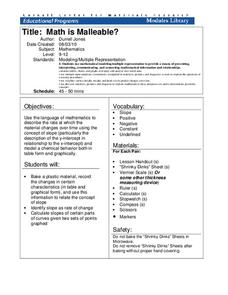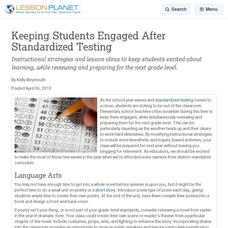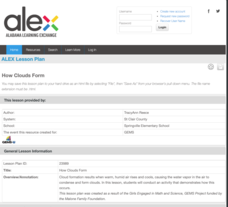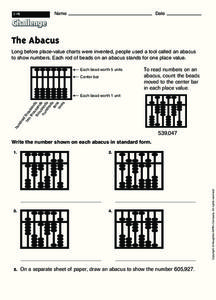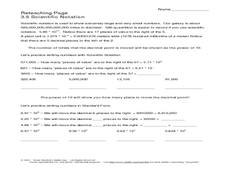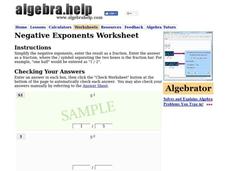Cornell University
Math Is Malleable?
Learn about polymers while playing with shrinky dinks. Young scholars create a shrinky dink design, bake it, and then record the area, volume, and thickness over time. They model the data using a graph and highlight the key features of...
EngageNY
TASC Transition Curriculum: Workshop 8
Lights, camera, action! Math educators consider how to improve their instruction by examining a model of the five-practice problem-solving model involving a movie theater. Participants examine cognitive demand in relation to problem...
Curated OER
Keeping students engaged after standardized testing
Instructional strategies and lesson ideas to keep students excited about learning, while reviewing and preparing for the next grade level.
Virginia Department of Education
Exponential Modeling
Investigate exponential growth and decay. A set of six activities has pupils collecting and researching data in a variety of situations involving exponential relationships. They model these situations with exponential functions and solve...
Concord Consortium
Circling
Come full circle in learning about conic sections. Learners first look at the type of conic section formed when concentric circles intersect a standard coordinate plane. They then see which type forms when two sets of concentric circles...
Doing Maths
Converting Metric Measurements Code-Breaker
Can your scholars crack the code of this metric worksheet? To start, mathematicians must convert different units of measurement to the standard metric system form. Then, pupils plug in the corresponding letter to the correct answer to...
Alabama Learning Exchange
How Clouds Form
Young scholars analyze how clouds form. In this cloud formation lesson, learners brainstorm types of clouds and what they think they're made of. Young scholars conduct an experiment to see how clouds form and discuss their observations....
Curated OER
Decimal War
Pupils play a math game. In this decimals and fractions lesson, they use base ten blocks to practice converting between decimals and fractions. Everyone plays a game called Decimal War to practice these concepts.
PBS
Surface Area and Volume
You and your class will like this lesson on using visual models to relate the volume and surface area of solid shapes. Learners construct three-dimensional forms using nets. They calculate the surface area and volume for each and then...
Curated OER
The Abacus
The class reads an explanation of the how the ancient calculation tool, the abacus, works. They examine four abacus images and record the number shown on each of them.
Curated OER
Who's On First?
Have you ever considered why the number 10 is so important to us? That's what learners do here. They explore patterns formed by powers of ten and by decimals, convert units of measure within the metric system, and express these in the...
Virginia Department of Education
Factoring for Zeros
Relate factors to zeros and x-intercepts. Scholars first graph quadratics in both standard and factored forms to see that they are the same. They go on to use the graphs to see the relationship between factors and x-intercepts.
Curated OER
Triangle's Interior Angles
Given a pair of parallel lines and a triangle in between, geometers prove that the sum of the interior angles is 180 degrees. This quick quest can be used as a pop quiz or exit ticket for your geometry class.
Virginia Department of Education
Exploring 3-D Geometry
Take young mathematicians on an exploration of the world of 3-D geometry with this seven-lesson unit. After first defining the terms perimeter, area, and volume and how they apply to the real world, students continue on to learn the...
Curated OER
Arithmetic Complex Numbers
Students convert quadratic functions from standard form to vertex form. In this algebra lesson, students solve polynomials using synthetic and long division. They derive and apply the remainder theorem and factor theorem.
Curated OER
Identifying slope from Equations
Pupils find the slope of a line given a linear equation in slope-intercept form. They also find the slope of a line given a linear equation in standard form. Students finally graph the line to show it visually.
Curated OER
The Universe-Scientific Notation Extension
In this scientific notation worksheet, students write a set of 9 average distances in standard form, then complete 3 additional problems. A reference web site is given for additional activities.
Curated OER
Parabolas
In this parabolas learning exercise, 10th graders solve and complete 15 different problems related to parabolas. First, they define parabola and its information related to graphing one. Then, students write each equation in standard...
Curated OER
Number Theory: Scientific Notation
In this scientific notation worksheet, students solve a total of 10 problems, writing numbers given in problems using scientific notation, then numbers given in scientific notation in standard form.
Curated OER
Place Values Through Hundred Thousands
In this place value through hundred thousands activity, students write 4 numbers in short word form, expanded form, word form, and standard form.
Curated OER
Understanding Scientific Notation
In this understanding scientific notation instructional activity, 6th graders read the examples, then practice 3 writing numbers with scientific notation and 3 numbers in standard form.
Curated OER
Extra Practice 11.1: Parabolas
In this parabolas worksheet, students solve 28 short answer problems. Students find the focus, directrix, axis, and equations of parabolas. Students match the equation of a parabola with it's correct graph.
Curated OER
Multiplying by Powers of Ten (E)
In this math learning exercise, students multiply whole numbers by powers of ten. Problems are presented in two formats, one with exponents and the second with out exponents. The first page of the learning exercise includes twenty-six...
Curated OER
Negative Exponents Worksheet
In this negative exponent worksheet, students solve equations with negative exponents. They explore changing negative exponents to positive ones. Students simplify given problems changing them from exponential form to standard form. ...


